
Arakin_1_kurs
.pdf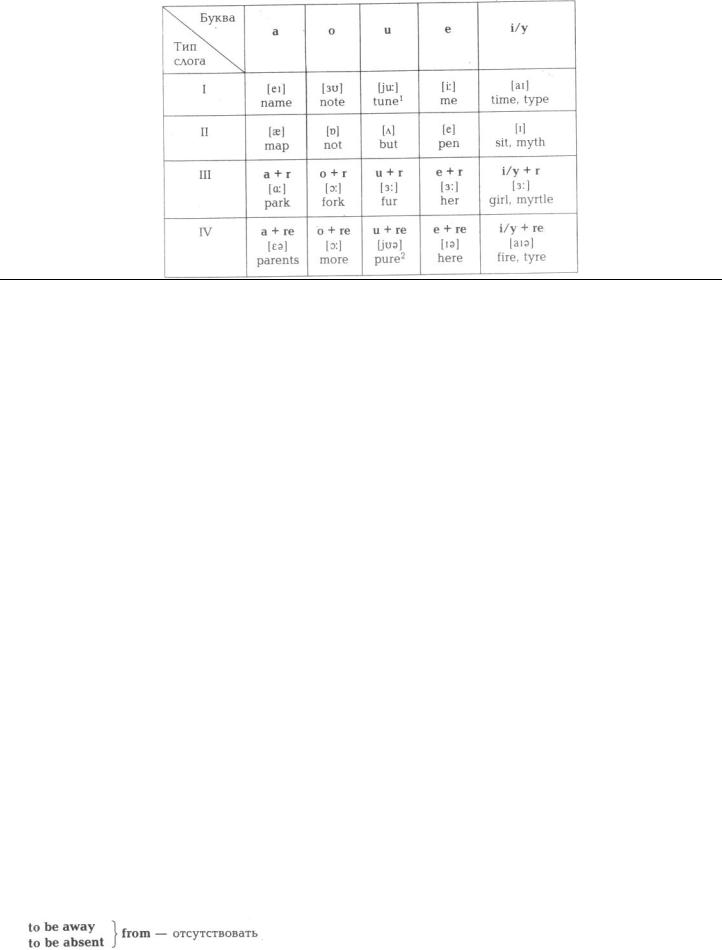
1 [r], [1], [ ] u [u:], : rule [ru:l], plume [plu:m], June [ u:n].
2 [ ], [ ], [r] + 1 u [ ]. : sure [ ], jury [' r ], rural ['r r l], plural [' l r l].
TEXT
Our english lesson
T e a c h e r : Good morning, all! Sit down, please! I expect no one is away? M o n i t o r : Nobody is. All are present. Oh, sorry, Ann is not here.
T e a c h e r : What's up? Is she ill?
M o n i t o r : It's flu with a high temperature.
T e a c h e r : That's too bad. Well now. Let's begin. We'll check our homework. Mike, will you take your exercise-book and come to the board?
M i k e : Shall I write the words in transcription?
T e a c h e r : Do. And you, Helen, read Text 7, will you? The others should write down the mistakes if she has any. Do you follow me? Will you read a little louder, please. That'll do. Any mistakes noticed?
J u l i a : I believe there's some palatalization in the nouns "family" and "Benny".
T e a c h e r : That's it. Please, Helen, pronounce the words. Now it's correct. You must work more.
Pronunciation is your weak point, I'm afraid.
H e l e n : Shall I read the text again for the next time?
T e a c h e r : Yes. Have another try and make your reading more distinct. Now everybody look at the board!
M i k e : Shall I read the exercise?
T e a c h e r : Of course. (Mike reads). Is everything correct, Pete? P e t e : I think it is.
T e a c h e r : Thank you, Mike. Clean the board, please, and go to your seat. (To the monitor). Have we got the headphones ?
M o n i t o r : Here they are.
T e a c h e r : Fine. Let's listen to the new text. Open your books at page 81. Will you please switch on the cassette-recorder? Thank you.
Vocabulary notes
I expect = I believe = I think
[b] absent. to be present ( , . .)
What's up? ?
61
temperature
That's too bad. .
to check (go through) the homework
exercise-book
transcription . Shall I write it in transcription? )
? Shall I...? ,
. : Shall I begin? ? Shall I read? ? Shall I open the window? ?
: Read Text 7. Write Exercise 3. ,
, : Find page 81. to write (put) down to follow ; .
louder . Will you read louder? ,
.
That'll do. .
noticed ,
palatalization ,
That's it. .
to pronounce ; pronunciation
weak point
have another try ( )
distinct
headphones ,
Here they are. !
to switch on ; to switch off
cassette-recorder (tape-recorder)
Topical vocabulary
Classroom Expressions
62
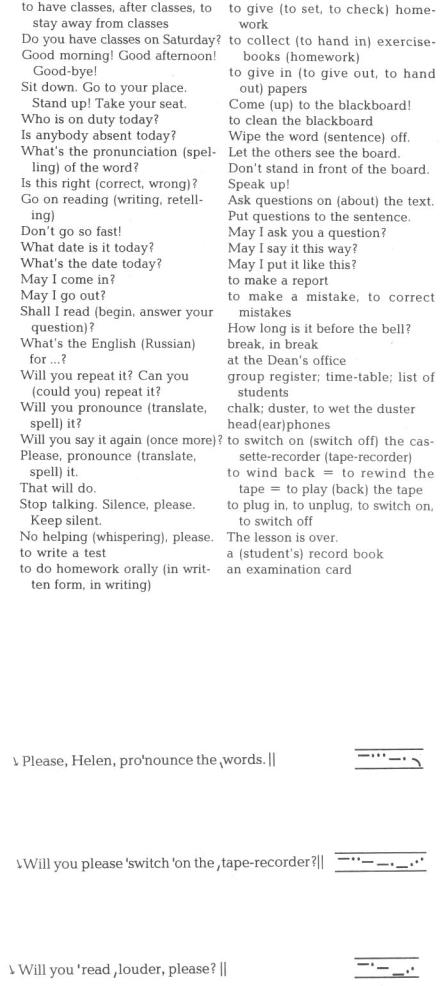
Phonetic notes
1. please .
) ( ), ,
. :
b) please ,
. :
) please ,
:
63
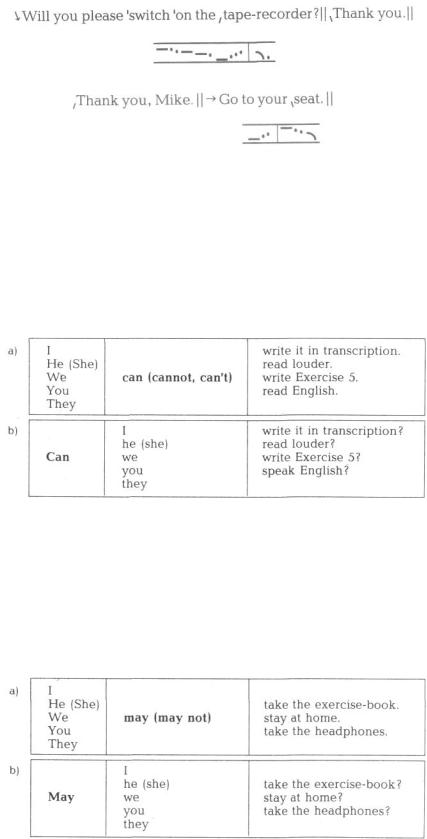
2. Thank you.
. , ,
:
Study the following
Modal verbs
T a b l e N o . 1
Can
e. g. Can you read louder? - Yes, I can. No, I can't.
Note. can: cannot.
T a b l e N o . 2
May
e. g. May I stay at home? - Do, please. Yes, you may. - I am afraid not. No, you mustn't.
Note. must .
64
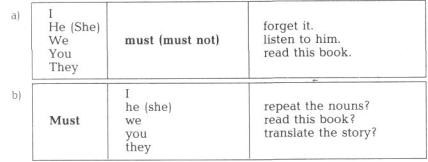
T a b l e N o . 3
Must
e. g. Must I read this book? - Yes, you must. No, you needn't.
Note. must
need - needn't, .
Exercises
I. a) Study Substitution Tables No. 1, 2, 3 and compose as many sentences as you can. Let the members of the class ask and answer questions as in the model. Give a short answer using contracted forms and add a sentence of your own.
M o d e l : May I stay at home on Saturday?
No, you mustn't. You are to go to your classes.
b) Respond to the negative sentences of your fellow-student as in the model. Use contracted forms in speech.
M o d e l : I can't write Exercise Three.
You needn't do it now.
II. a) The material below is to be prepared for reading. Mark the stresses and tunes. Concentrate your attention on the vowel [ae]. b) Let your fellow-student read this exercise aloud for you to detect his possible errors in sounds. Tell him what must be done to eliminate them:
[ ] 1. That's the man who sat on my hat in the tram.
2.Once there lived a lad who was always very sad. For he hadn't any mother and he hadn't any dad.
3.Where are you going to, my little cat? I'm going to town to buy a hat!
What! ? A hat for a cat? A cat in a hat? Who ever saw a cat in a hat?
III.Write the following words and phrases in transcription and explain the reading rules:
share, store, here, cure, fur, term, more, firm, spare, sphere, wire, mere, a spare moment, a famous painter, a rare ring, the upper teeth, the thick wood, the first letter, the next room, the full moon, the vast territory.
IV. Before you start working at the text practise the sounds in the following words and word combinations:
1.[i:] - please, read, believe, weak, clean;
[ ] - ill, begin, transcription, distinct, listen, switch;
65
[e] - lesson, present, temperature, let, exercise, check, text, rest, any, correct; [ ] - absent, bad, palatalization, family, thank.
2.a) Alveolars replaced by dentals: in the nouns, at the board, read the text, clean the board;
b)Loss of plosion: sit down, read Text 7, write down, next time;
c)Clear [ ] before [j:]: will you take, will you please switch on the cassette-recorder?
V. a) Listen to the recording of the text "Our English Lesson". Mark the stresses and tunes. b) Practise the text for test reading. Listen to the text very carefully until you can say it in exactly the same way. c) Memorize the text and dramatize it.
VI. Transcribe the following sentences, mark the stresses and tunes. Read the sentences aloud:
1. Don't go to the cinema tonight. 2. Don't forget. 3. Get us some chalk. 4. Pronounce the sentence. 5. Find page twenty-nine. 6. Stand up, please. 7. Good morning, everybody. 8. Sit down, please. 9. Any mistakes noticed? 10. Is everything correct, Pete ? 11. What's the pronunciation of this word ? 12. Do you follow me?
VII. Answer the following questions:
A.1. Can you speak English well? 2. Can you speak French well? 3. Can you understand Spanish? 4. Can you count the chairs in this room? 5. Can we write without a pen or a pencil? 6. What can we do with a fountain-pen? 7. May I take your textbook? 8. May Helen leave the classroom? 9. May we go to the pictures?
10.Must we speak English now? 11. What must we have if we want to write a letter? 12. What must we have if we want to buy something? 13. What must we use if we want to wash our hands? 14. What must you do when you have flu? 15. What must you do to make your reading distinct?
B.1. Is this your pen or mine? 2. Whose bag is this? 3. Is this watch yours or mine? 4. Is that watch hers or his? 5. Is this your room or theirs? 6. Is this box yours or ours? 7. Is this your desk or their desk? 8. Is this notebook mine or yours? 9. Is this cassette-recorder ours or theirs?
C.1. How many students are there in your group? 2. How many students are absent? 3. How many students are present? 4. Who is the monitor in your group? 5. What is the monitor's name? 6. Have you got any bag? 7. Where is your bag? 8. Have you got a ball-pen? Is it a good one? What colour is it? 9. Is there much chalk at the board? 10. Have you many books at home? 11. Are there Russian or English books in your bag? 12. Have you got a watch? Is it right or wrong? 13. Is N's watch fast or slow? 14. Is A's dress black or brown? 15. Is B's ball-pen green or yellow?
VIII. a) Write the interrogative and negative forms of the following sentences:
1. She can spell the noun correctly. 2. You may take your exercise-book. 3. He can write this in transcription. 4. There are some mistakes in her dictation. 5. My sister has got two interesting magazines. 6. Doctor Sandford is busy in his study. 7. Spelling is her weak point.
b) Express your surprise at the given statement as in the model.
M o d e l : You may take those pencils.
Oh, may I?
Of course, you may.
) Respond to the same statement in the negative.
M o d e l : You may take those pencils.
Oh, no. I'm afraid, I may not take them.
IX. Work in pairs. Ask your fellow-student logical questions on the given statements and answer them. Use the modal verbs:
66
1. We have got headphones for the whole group. 2. Everybody must go to the laboratory today. 3. Mary can help us with the cassette-recorder.
X. Fill in the missing modal verbs:
1. You ... go out today. It's too cold. 2. |
... I take your fountain-pen? - Do, please. 3. We ... not carry the |
||||
bookcase upstairs. It is too heavy. 4. When ... |
you come to see us? - I ... come only tomorrow. 5. Shall I write a |
||||
letter to him? - No, you ... |
, it is not necessary. 6. Mary ... |
finish the work at once. 7. ... |
you cut something |
||
without a knife? 8. Peter ... |
return the book to the library. We all want to read it. 9. Why ... |
not you understand |
|||
it? It is so easy. 10. ... |
we do the exercise at once? 11.... you pronounce this sound? |
|
|||
XI. a) Write sentences according to the following models using the words and word combinations given below.
M o d e l 1 : Let's begin our morning exercises.
read the text; write on the blackboard; do the exercises; speak to the dean. M o d e l 2 : Shall I write it in transcription?
clean the blackboard; bring some chalk; do my homework; answer your question; spell the noun; press the button; pronounce it.
d e 1 3 : Listen to the new song.
the teacher; your fellow-students; the radio, the story; the text; the tune; the cassette-recorder; the actor. M o d e l 4 : Look at the clock.
the picture; the house; the blackboard; the bird; the child; the lamp; the cup; the plate.
b)Give sentences of your own using the same models.
c)Make up micro-dialogues, as in the following models. Use the above-mentioned words and word combinations. Give short answers. Add a sentence or two of your own.
M o d e l 1 : Let's begin our morning exercises.
Yes, let's. (I'm afraid I can't.) In half an hour we must have breakfast.
M o d e l 2 :
M o d e l 3 :
Shall I write it in transcription?
Do, please. (No, you needn't.) We are to discuss it then.
Let's listen to the new song.
I'd love to. I'm fond of folk songs.
M o d e l 4 : Look at the clock.
Oh, it's beautiful (lovely, ugly, etc.). I'd like to have one.
XII. a) Make up sentences on the following model. Make your sentences interrogative and negative.
M o d e l : We have got skates.
b) Express your surprise at the given statements as in the model.
M o d e l : I have got a cassette-recorder.
Have you really got a new one?
67
c) Respond to the same statements in the negative.
M o d e l : I have got a new cassette-recorder.
That can't be true. You haven't got any (cassette-recorder) .
XIII. Make up sentences according to the model.
M o d e l : This apple is mine.
XIV. Translate the following into English using classroom expressions:
1. ? - . ? - . . 2.
. . 3. ? - , . 4. ? - 15 . 5. ? - . - 48? - .
, , . 6. « » (« », « »)? 7.
? - , . ? - , .
? - . ? - . ? - , . ? -, . 8. , . , . , .
. 9. . . 10.
. . 11. ( , ,
, )? 12. ? - . ? - . . 13. . . .
. 14. ( , ). 15. ( , ,
). 16. , . . ? - . 17.
« » (« », « »)? 18. « » (« », « », « »)? 19. . 20. , . 21.
, . 22. , . 23. ,
, . 24. ? - , , . 25.
? - . . 26. .
XV. a) Write the following numerals in words:
395, 745, 1950, 13 408, 282 867, 345 296, 5 712 133.
b) Read the following numerals:
273, 1882, 19 176, 30 016, 55 744, 81 614, 389 107, 6 271 398.
XVI. a) Ask your fellow-student for permission ...
to go out; to come in; to open the window; to take the newspaper; to read; to go home; to begin reading; to close the door.
(The person you ask must give any of the following answers: Certainly. You may. Do, please. I'm afraid not. You mustn't.)
M o d e l : May I speak to the dean? - You may.
May I leave now? - I'm afraid not.
b) Give your permission to perform the actions given above.
M o d e l : You may speak to the dean.
c) Ask your fellow-students to perform the actions given above. Don't forget to be polite.
M o d e l : Speak to the dean, please. (Will you speak to the dean?)
d) Ask your fellow-students not to perform the actions given above.
68

M o d e l : Please, do not smoke here.
XVII. Arrange short dialogues using modal verbs.
M o d e l s : 1. May I take your pencil? - I'm afraid not, I need it.
Have you got a pen? - Yes, I have. - May I take it? - Certainly. (Of course, you may.)
2.Can you come to see us tonight? - Sorry, I can't, but I can come tomorrow. - All right.
3.Shall (must) I read this exercise once more? - No, you needn't. That will do. Your reading is quite good.
XVIII. Write a short description of your classroom using the construction there is, there are.
XIX. Act as a teacher of English. Ask your pupils:
1. to clean the blackboard; to use the duster; to bring some chalk; 2. to tell you the date; to write it on the board; not to stand in front of the board; 3. to come up to your desk; to read the text; not to go so fast; to go to his place; 4. to check homework; to correct the pronunciation or spelling of some word; 5. to collect the exercise-books and to hand them in; 6. to switch on the cassette-recorder; to listen to the text; 7. to wind (play) it back; to switch off the cassette-recorder; 8. to have another try and read distinctly.
XX. Stage a dialogue between a teacher and a student using classroom expressions:
1. beginning a lesson; 2. checking homework; 3. reading the text; 4. writing on the blackboard; 5. listening to the cassette-recorder; 6. giving homework.
Additional phonetic exercises
1.Read the exercises several times before the mirror.
2.Record your reading and listen to it, detect your errors.
3.Listen to your fellow-student reading the exercises. Detect his errors in sounds and intonation and tell him what he must do to get rid of them:
Laboratory work
I. Repeat the sentences after the tape.
II. a) Listen to the questions and record your answers in the intervals. b) Listen to the key and correct your mistakes.
III. a) Make the given sentences interrogative and negative. Record your sentences. b) Check your sentences with the key.
IV. a) Make questions beginning with Where ... to the given statements. b) Make questions beginning with When
... to the given statements. c) Make questions beginning with Why ... to the given statements. d) Make questions beginning with Whom ... or To whom ... to the given statements.
V. Listen to the sentences. Supply short questions expressing surprise, doubt.
VI. Listen to the sentences. Change the construction using the absolute form of the possessive pronouns.
69
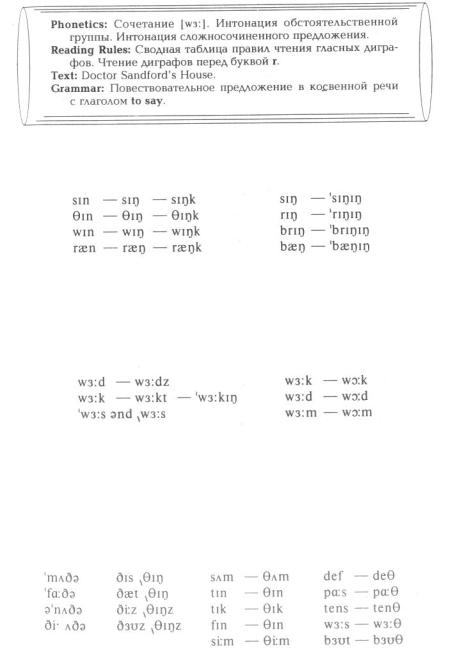
Model: This is her coat. - This coat is hers.
VII. Compose sentences on the model using have got or has got.
VIII. Translate the sentences into English.
IX. Listen to the disjunctive questions. They are not true to fact. Correct them.
X. Listen to the poem "The Arrow and the Song" by H. W. Longfellow. Mark the stresses and tunes. Read and memorize it.
Lesson Nine
Phonetic Exercise 38
. , [k] [g]
[ ] .
Phonetic Exercise 39
. , :
1.[w] [ :].
2.[ ] [ ] [ :].
3.[w] [ :].
Phonetic Exercise 40
70
